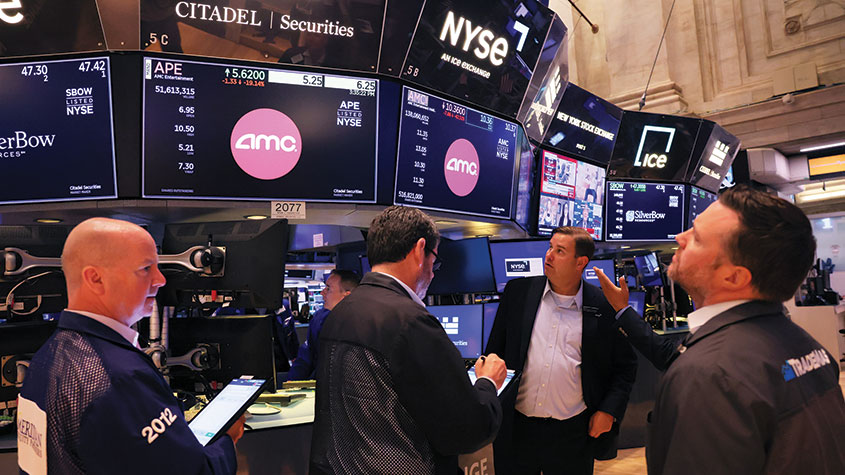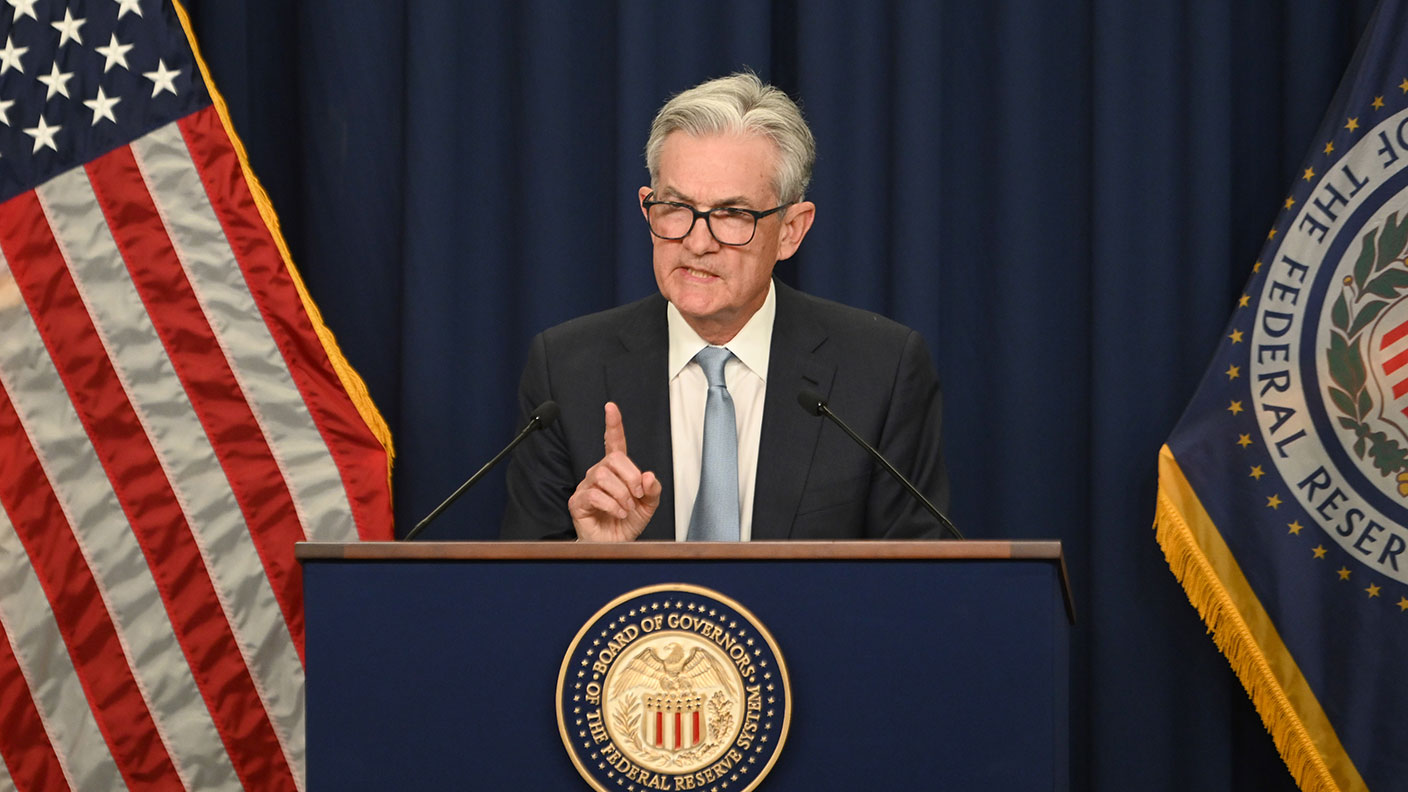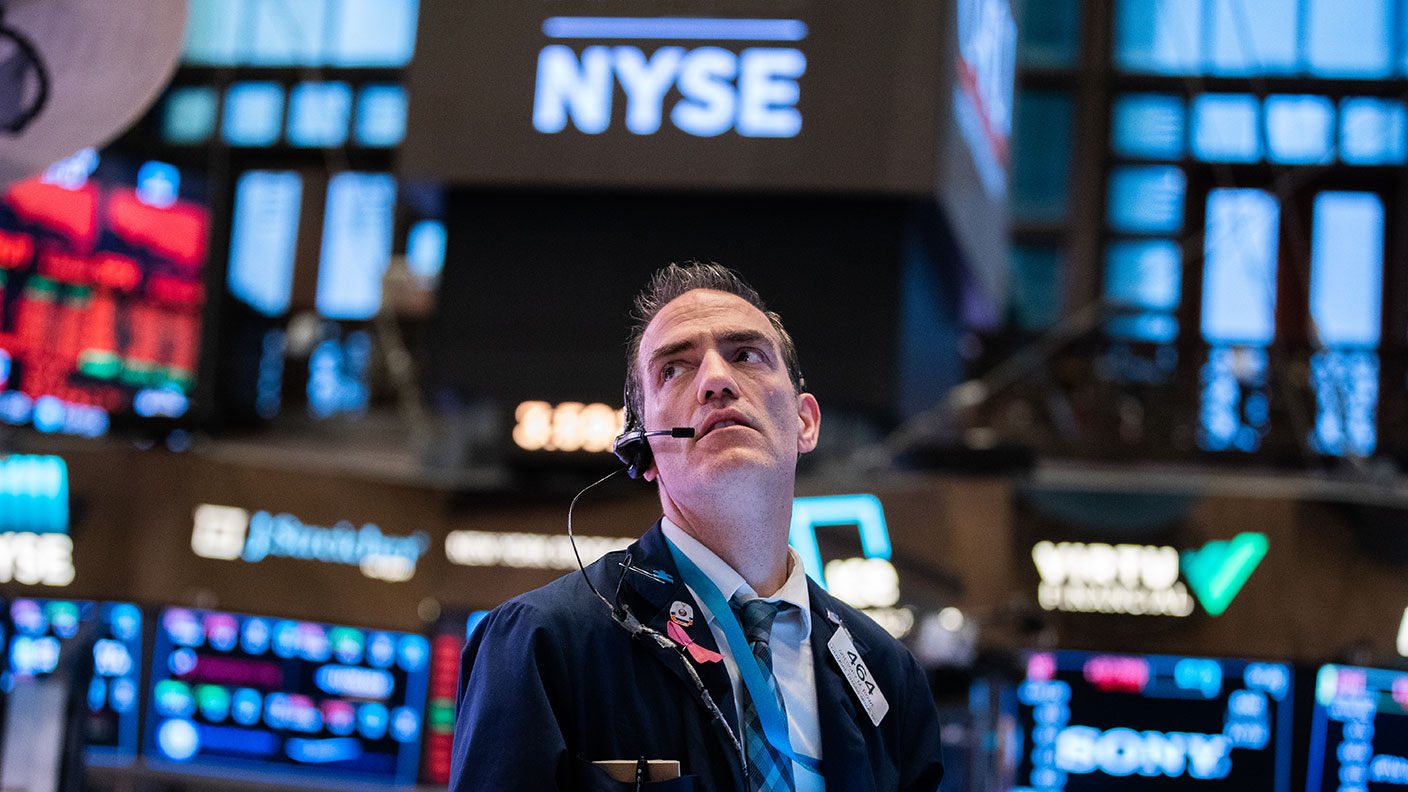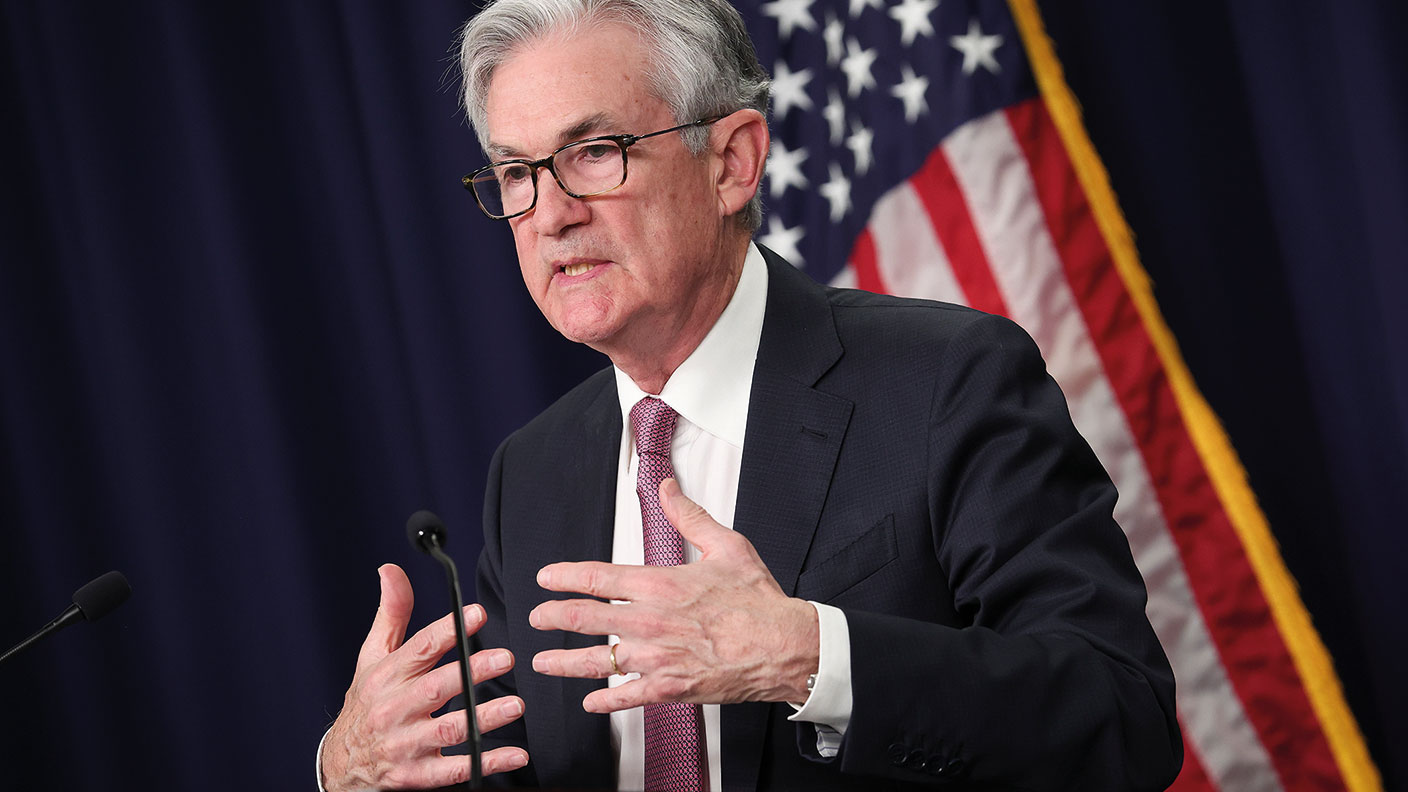David Stockman: Hold gold and cash; abandon all equities
Merryn Somerset Webb talks to author David Stockman about why American capitalism is so dangerously out of control, and what investors can do to protect their wealth.

Get the latest financial news, insights and expert analysis from our award-winning MoneyWeek team, to help you understand what really matters when it comes to your finances.
You are now subscribed
Your newsletter sign-up was successful
Want to add more newsletters?

Twice daily
MoneyWeek
Get the latest financial news, insights and expert analysis from our award-winning MoneyWeek team, to help you understand what really matters when it comes to your finances.

Four times a week
Look After My Bills
Sign up to our free money-saving newsletter, filled with the latest news and expert advice to help you find the best tips and deals for managing your bills. Start saving today!
David Stockman is either a very nice man or a man desperate for publicity. My view is he's the former. After all, Google his name and book (The Great Deformation: The Corruption of Capitalism in America), and you'll get going on 400,000 hits, and he has been on the bestseller lists since it was released in April. So there is no real reason for him to have agreed to meet me and John Stepek, and to be interviewed on MoneyWeek TV in the middle of a family holiday, other than pure niceness.
Stockman's premise is that something is very wrong with America. His argument will be familiar to many MoneyWeek readers. The "government is out of control". The central bank is the most out of control' bit of all. The rot set in back in 1971, when President Richard Nixon "effectively defaulted on Bretton Woods" by abandoning the gold standard. Bretton Woods provided "a system of financial discipline" where countries had to balance their budgets at least periodically. You couldn't run huge annual current-account deficits, as the US has for some time, and you couldn't have the kind of budget deficits we all now accept as standard, "year after year". Back then, the political system had "reason to force tough choices". That's no longer true.
As a result, the government has become less a sensible ruler and more a "serial bubble machine". This isn't "sustainable for much longer". Markets are dependent on the "juice of the Federal Reserve zero overnight money" and on the assumption that the Fed won't change anything in a hurry. "I think that corrupts financial markets," says Stockman. We do not have true price discovery we just have everyone trading cheap money off the back of the "latest word clouds coming out of the Fed". And as we're seeing right now, every time the Fed hints it might pull back tapering' there is a "violent reaction", and another Fed mouthpiece has to reassure everyone that nothing will happen "quite yet", that the economy is still too "soft" for any withdrawal from quantitative easing (QE). This is all the evidence you need to see that "the Fed has painted itself into a corner". This is a dangerous situation. It's "going to blow one day when they lose control".
MoneyWeek
Subscribe to MoneyWeek today and get your first six magazine issues absolutely FREE

Sign up to Money Morning
Don't miss the latest investment and personal finances news, market analysis, plus money-saving tips with our free twice-daily newsletter
Don't miss the latest investment and personal finances news, market analysis, plus money-saving tips with our free twice-daily newsletter
What is to be done?
You will be able to listen to some of this interview on Moneyweek TV. But after the cameras were switched off, and before Stockman went back to his holiday, I asked him what he would do, given the opportunity to sort all this out. His first move would be "radical reform of the Fed". It's become a "monetary central-planning agency", targeting not just inflation and unemployment, but "every nook and cranny of the economy", from housing starts to GDP growth. That's not what its founders had in mind nor is it possible in a $16trn economy. So the Fed needs to go back to basics. It shouldn't set interest rates that should be done by the "free market and the interaction of millions of producers, investors and speculators" within it. The Fed should be a bankers' banker providing liquidity when banks present "good collateral".
This is not to say that monetary policy has never worked on the surface. When an economy's balance sheet is "relatively clean", you can "induce households and businesses to borrow". You cut rates, they "ratchet up their... leverage" and you seem to get growth. This happened six times after 1950. But the net result is that the US permanently shifted the level of household borrowing up, up and up again. So in the 1950s and 1960s, before this policy really got going, households had borrowing equivalent to around 80% of income. Today it's 200%. They are at "saturation point". However low rates go, they can't and won't borrow more. All the liquidity from QE is "sequestered in the canyons of Wall Street".
Stockton clearly thinks that the US state has over-reached itself in terms of both fiscal and monetary policy. So what should the role of the state be? Little more than to "fund and manage" a safety net. There are always people who will be left behind, particularly in an industrial society "going through the kind of changes" we see today. There are plenty of entry-level jobs that "don't provide a living wage" in America (and in Britain). So you need cash transfers perhaps via a negative income tax (so that those earning below a certain amount get topped up). Cash transfers, rather than benefits in kind?
Absolutely, says Stockman. One key problem in the US has been the "capture" of the state by hordes of different interest groups. Once you start giving particular benefits housing subsidies, medical subsidies, etc "the providers take control and it is another capture". So we should just top up salaries in cash and leave the market to its own devices.
What else? We "shouldn't be trying to improve the energy economy". We shouldn't be in agricultural subsidies particularly "after the greatest commodity boom" in decades. The defence budget should be slashed it's a "relic of the cold war" that remains because the military industrial complex wants it to. Defence is seen as a kind of job creation area "we are buying massive tanks that we can never use... because it keeps a tank line going in Ohio". But why produce and buy things we don't need and can't use and that can be "counter productive" to own? You might as well "build pyramids". This isn't economic growth (which is why GDP numbers are such nonsense).
Time to get out of housing
And the US "really ought to get out of the housing business". Property prices are still based on the wrong interest rates the wrong price of money so remain hugely overvalued. A property's price is based on the amount the last buyer could borrow, not the amount the next one can borrow. So once the mortgage market normalises (as bond yields rise) and the "refi boom" is over, the housing market will weaken again. Then all the hedge funds that have been buying into this recovery will be out as fast as they got in. It's a real disaster "getting ready to unwind again".
All this cheap money also means the world is now "overbuilt", says Stockman. We're "drowning in excess capacity", from mines to car factories. That's why commodity prices are falling. If only the "Keynesian economists that advise the government and increasingly Wall Street" could grasp this.
Given the sales of his book, is it possible that if the government doesn't get it, the man in the street does? Maybe, he says, but that is unlikely to change anything. The system creates so much short-term gain for so many, that any incentive to change so as to avoid long-term disaster isn't there: "it is hard to dislodge the forces that benefit".
Stay out of harm's way
What can an investor do about all this? "Stay out of harm's way," he says. Preserve capital by not being lured into yet another stock-market bubble. The "perversion" of Fed policy is to force people to take extreme risks for yields of 2%-3%. So there are bubbles everywhere. The bond market is about as obvious a bubble as you can get, given "over half of the flows are being bought" by the Fed. Most of the market is also "front-running the Fed" speculators are so confident that the overnight rate will stay at zero (that Bernanke will "do whatever it takes"), that their trades are based on this alone. But when they believe in tapering, they will unwind those trades at astonishing speed. So expect a "violent repricing of the bond market" that will spread to all other asset prices.
What's the trigger? It only takes one central bank losing control, as people realise they "can't keep rates rigged" for ever. Once one loses control, so will the others. Stockman's top candidate is the Japanese bond market, for the simple reason that he can't see how Japan can create 2% inflation (or why it should, given that a central bank's job should be stable prices) without causing havoc with Japanese government bond yields.
So where do we go? "I think gold is something that will have an enormous appreciation in value over a long period of time", given that the "monetary system of the world is falling apart". Most major central banks are as far down the QE line as the Fed is (the Bank of England is a "giant disgrace" and "sooner or later" the European Central Bank will join in too). In the short term, there is bound to be volatility in the gold price there is speculation on margin here but given that in gold you are effectively holding the "inverse of central banks", over time it will "be the only good asset to own".
Does he hold stocks? "No." This is global: "if you believe what I say about the US, then it is true throughout the world". So what does he hold? Stockton is on his way to Europe on an art-buying trip. Is this an investment? He doesn't see it that way it is more of a hobby and it isn't an attempt to hold real assets in advance of fast-rising inflation (he is a deflationist, based on the excess capacity mentioned above). He actually holds mostly cash. "This is about capital preservation... when you see the state this out of control... be afraid."
The Great Deformation: The Corruption of Capitalism in America by David Stockman. PublicAffairs, £25.
Who is David Stockman?

Born in Texas in 1946, David Stockman was elected to Congress in 1976, and appointed Director of the Office of Management and Budget for US president Ronald Reagan in 1981. His goal of shrinking the state by cutting both taxes and public spending, and having balanced budgets, made him a controversial figure. In 1981, US magazine The Atlantic published a frank interview in which he was quoted as saying that "none of us really understands what's going on with these numbers". He left in 1985, and his 1986 memoir, The Triumph Of Politics, argued that lobbying by special interest groups to stop spending cuts had derailed the Reagan revolution'.
He went on to join Salomon Brothers, then private-equity firm Blackstone Group. In 1999 he formed his own private-equity fund, Heartland Industrial Partners. In 2005, one of its major investments, Collins & Aikman, applied for bankruptcy and, in 2007, he was accused by the Securities & Exchange Commission of defrauding investors. The case was settled in 2010 when Stockman paid $7.2m in fines. His new book has been acclaimed by critics on both the left and the right of the political spectrum, and described by Reuters Breakingviews as "gloomily persuasive and bodes ill for the future".
Get the latest financial news, insights and expert analysis from our award-winning MoneyWeek team, to help you understand what really matters when it comes to your finances.

-
 Early signs of the AI apocalypse?
Early signs of the AI apocalypse?Uncertainty is rife as investors question what the impact of AI will be.
-
 Reach for the stars to boost Britain's space industry
Reach for the stars to boost Britain's space industryopinion We can’t afford to neglect Britain's space industry. Unfortunately, the government is taking completely the wrong approach, says Matthew Lynn
-
 As China reopens, why pick an income strategy?
As China reopens, why pick an income strategy?Advertisement Feature Yoojeong Oh, Investment Manager, abrdn Asian Income Fund Limited
-
 A new dawn for Asian markets?
A new dawn for Asian markets?Advertisement Feature James Thom, Investment Manager, abrdn New Dawn Investment Trust plc
-
 The end of cheap money hits the markets
The end of cheap money hits the marketsNews Markets have swooned as central banks raise interest rates, leaving the era of cheap money behind.
-
 Are stocks back in a bull market or is this just a bear market rally?
Are stocks back in a bull market or is this just a bear market rally?News The S&P 500 index gained 17% between its June lows and 16 August, while the Nasdaq Composite rose more than 20%. So are stocks back in a bull market or is this just a brief rally before they resume their slide?
-
 Enjoy the bear market rally while it lasts
Enjoy the bear market rally while it lastsNews Investors seem to think that a weaker US economy will cool inflation and see the Fed relent on interest rate rises. But that optimism may be misplaced, with July’s stockmarket gains looking very much like a bear-market rally.
-
 The Fed really is fighting inflation – so don’t expect an early end to the bear market
The Fed really is fighting inflation – so don’t expect an early end to the bear marketAnalysis In an attempt to contain raging inflation, the Federal Reserve has raised US interest rates by 0.75 percentage points. And it’s going to keep on raising them till something breaks, says John Stepek.
-
 The Federal Reserve wants markets to fall – here’s what that means for investors
The Federal Reserve wants markets to fall – here’s what that means for investorsAnalysis The Federal Reserve’s primary mandate is to keep inflation down, and lower asset prices help with that. So, asks Dominic Frisby – just how low will stockmarkets fall?
-
 Interest-rate rises mean more pain for stocks
Interest-rate rises mean more pain for stocksNews Interest rates are rising around the world as central banks try to get inflation under control. That’s hitting stockmarkets – and there is more pain to come.